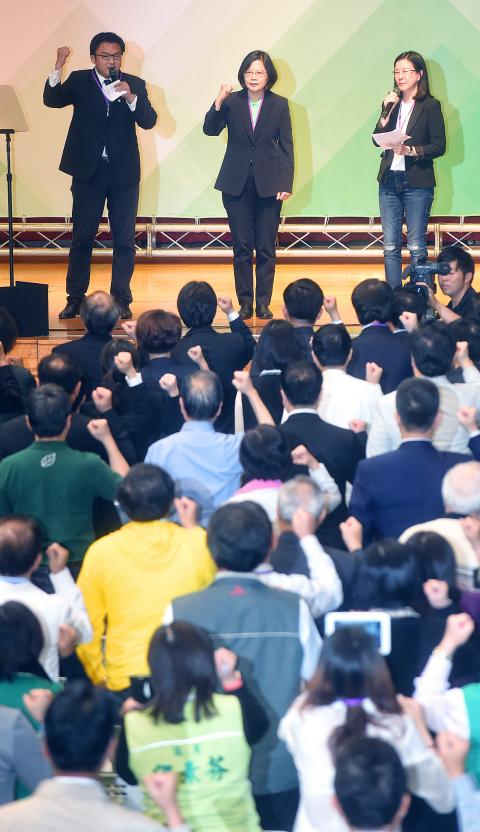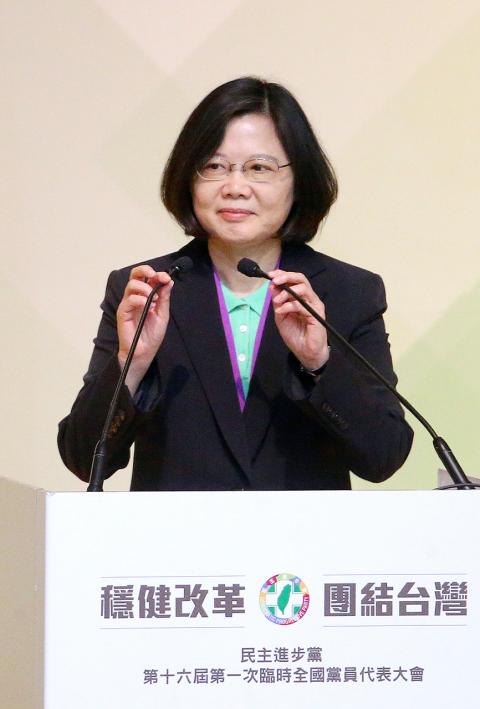The Democratic Progressive Party (DPP) yesterday amended its charter to exempt certain high-ranking government officials from serving in party positions, while amending the party’s Regulations on Clean Politics to penalize party members who fail to avoid conflicts of interest.
“The public might not know why we are holding an irregula national congress to revise our party charter,” president-elect Tsai Ing-wen (蔡英文) said.
“According to the DPP’s original charter, certain government officials are also required to serve as the party’s Central Standing Committee [CSC] members,” she said. “Such a rule was meaningful in the past, but we must reform it under the current situation.”

Photo: CNA
Tsai said that the DPP would look for talented people across party lines who share similar ideologies with the DPP to serve in the new government.
For instance, vice president-elect Chen Chien-jen (陳建仁) and premier-designate Lin Chuan (林全) are not DPP members, Tsai said.
The revisions also show the DPP’s determination to promote neutrality of government officials, Tsai said.

Photo: CNA
“Exempting officials from having to also serve as the party’s CSC members would turn the relationship between officials and the DPP into a partnership, instead of a supervisor-to-subordinate relationship,” Tsai said. “They report to the people of Taiwan, not to the CSC, and that is why today’s [yesterday’s] party charter revisions are important.”
The original charter stipulates that party members serving as vice president, Presidential Office secretary-general and deputy secretary-general, Cabinet ministers and deputy ministers, as well as several other central government positions, must be party delegates, while DPP members serving as vice-president, premier and Presidential Office secretary-general are mandatorily CSC members under a DPP administration.
The article giving the president the option of doubling as the DPP chairperson remained unchanged.
The party charter was also amended to allow local government heads affiliated with the DPP, as well as legislative caucus officials, to serve as CSC or Central Executive Committee members, since they are elected by popular vote and represent their constituencies.
Meanwhile, the congress also amended the Regulations on Clean Politics to authorize the party’s Clean Politics Committee to penalize party members who fail to avoid conflicts of interest.
As the regulation was amended after the controversial purchase and sales of OBI Pharma Co (台灣浩鼎) shares owned by Academia Sinica president Wong Chi-huey’s (翁啟惠) daughter, the clause has been called “the Wong Chi-huey clause.”
However, Taoyuan Mayor Cheng Wen-tsang (鄭文燦) denied that the amendment had anything to do with Wong, as he is not a DPP member.

CHAOS: Iranians took to the streets playing celebratory music after reports of Khamenei’s death on Saturday, while mourners also gathered in Tehran yesterday Iranian Supreme Leader Ayatollah Ali Khamenei was killed in a major attack on Iran launched by Israel and the US, throwing the future of the Islamic republic into doubt and raising the risk of regional instability. Iranian state television and the state-run IRNA news agency announced the 86-year-old’s death early yesterday. US President Donald Trump said it gave Iranians their “greatest chance” to “take back” their country. The announcements came after a joint US and Israeli aerial bombardment that targeted Iranian military and governmental sites. Trump said the “heavy and pinpoint bombing” would continue through the week or as long

TRUST: The KMT said it respected the US’ timing and considerations, and hoped it would continue to honor its commitments to helping Taiwan bolster its defenses and deterrence US President Donald Trump is delaying a multibillion-dollar arms sale to Taiwan to ensure his visit to Beijing is successful, a New York Times report said. The weapons sales package has stalled in the US Department of State, the report said, citing US officials it did not identify. The White House has told agencies not to push forward ahead of Trump’s meeting with Chinese President Xi Jinping (習近平), it said. The two last month held a phone call to discuss trade and geopolitical flashpoints ahead of the summit. Xi raised the Taiwan issue and urged the US to handle arms sales to

State-run CPC Corp, Taiwan (CPC, 台灣中油) yesterday said that it had confirmed on Saturday night with its liquefied natural gas (LNG) and crude oil suppliers that shipments are proceeding as scheduled and that domestic supplies remain unaffected. The CPC yesterday announced the gasoline and diesel prices will rise by NT$0.2 and NT$0.4 per liter, respectively, starting Monday, citing Middle East tensions and blizzards in the eastern United States. CPC also iterated it has been reducing the proportion of crude oil imports from the Middle East and diversifying its supply sources in the past few years in response to geopolitical risks, expanding

Pro-democracy media tycoon Jimmy Lai’s (黎智英) fraud conviction and prison sentence were yesterday overturned by a Hong Kong court, in a surprise legal decision that comes soon after Lai was jailed for 20 years on a separate national security charge. Judges Jeremy Poon (潘兆初), Anthea Pang (彭寶琴) and Derek Pang (彭偉昌) said in the judgement that they allowed the appeal from Lai, and another defendant in the case, to proceed, as a lower court judge had “erred.” “The Court of Appeal gave them leave to appeal against their conviction, allowed their appeals, quashed the convictions and set aside the sentences,” the judges